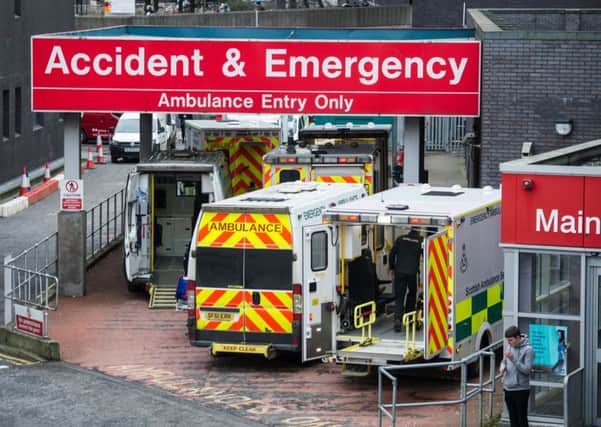A&E stab victims show battle against knife crime stalling


Scotland has received international recognition for its public health approach to tackling violence, which has been credited with helping to dramatically reduce knife crime.
But figures obtained by Scotland on Sunday show the number of knife-related A&E attendances in health board areas serving Edinburgh and Glasgow have remained largely static over the past five years and that admissions actually increased in the east of the country during the last 12 months.
Advertisement
Hide AdAdvertisement
Hide AdStatistics from NHS Greater Glasgow and Clyde (GGC) show there were 335 A&E attendances due to stab wounds in 2014/15 compared with 314 in 2017/18, a fall of around 6 per cent. Partial figures for the year 2018/19 show a total of 242 hospital admissions.
NHS Lothian said there were 56 admissions as a result of assaults with a sharp instrument in 2014/15, compared with 51 in 2017/18, a 9 per cent decrease. However, for the year 2018/19, there were 64 admissions for the 11 months to March. The number of hospital stays associated with such assaults rose from 94 to 113 over the same period.
Scotland’s long-term success at violence reduction has received growing international attention as a result of London’s current knife crime crisis.
Between 2007/8 and 2016/17, the number of homicide cases across Scotland fell by 47 per cent from 115 to 61, with Glasgow responsible for a third of the overall decrease.
Much of the credit has gone to the Violence Reduction Unit (VRU) which was formed by Strathclyde Police in 2005 and continues its work under the auspices of Police Scotland.
The VRU took a 2002 World Health Organisation report on violence and health and an anti-gang initiative first piloted on the streets of Boston in the 1990s as its starting points and set out to help Glasgow shed its murder capital tag.
It became the only police force in the world to adopt a public health approach to violence and knife crime, treating it like a disease to be cured with education, health and social work interventions.
Central to the VRU’s work is Navigator, a programme run in partnership with the charity Medics Against Violence, which reaches out to those attending A&E and seeks to move them away from a life of violence.
Advertisement
Hide AdAdvertisement
Hide AdDr Christine Goodall, of Medics Against Violence, said: “Injuries related to assaults by a sharp object are now at a very low level across Scotland and we’ve seen huge improvements in these figures, particularly since 2011/12 when there was a substantial reduction.
“Assault-related sharp force injury has never returned to pre-2011/12 levels in Scotland. Inevitably with all injury figures there will be some variation year-on-year and it is important to look at the trend over time rather than to compare individual years. For NHS GGC, from the information supplied, the trend is of an overall decrease, while in Lothian the figures show year-on-year variation but in general have remained at a similar level.”
She said it was encouraging that the large reduction in incidents seen prior to 2011/12 was due to a reduction in injuries among young people.
She added: “Knife-related injury must remain at the forefront of our efforts in prevention as it is still the case that the majority of homicides in Scotland, while at the lowest level for 42 years, are still committed with a sharp object.”
While violent crime has fallen across Scotland, it remains stubbornly entrenched in certain parts of the population. According to government statistics published last month, overall crime levels have fallen by 16 per cent since 2016/17.
However, 59 per cent of all violent crime was experienced by just 0.7 per cent of the population, with young working-class men most likely to be victims.
Scottish Conservative shadow justice secretary Liam Kerr said: “We can’t be complacent on this matter. It’s essential punishment for those guilty of knife-related offences is severe, both to protect the public and ensure there’s an effective deterrent in place.”
A Scottish Government spokeswoman said: “Recent figures show a long-term decrease in the number of emergency admissions as a result of an assault.
Advertisement
Hide AdAdvertisement
Hide Ad“Scotland has adopted a public health approach to violent crime, tackling the underlying causes of violence and not just the symptoms. Our approach to knife crime, focusing on prevention, is recognised across the UK and internationally as making a real difference in keeping people safer.”